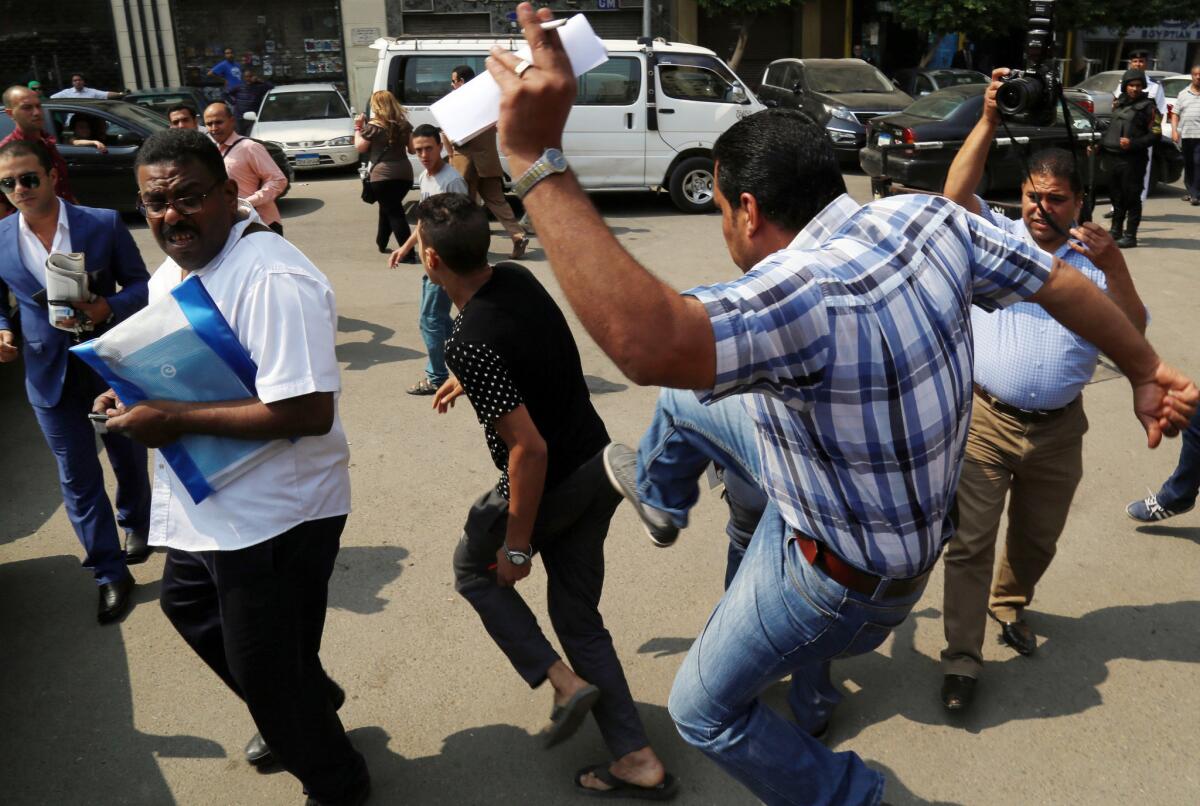Egypt court revives charges against Hosni Mubarak in protest deaths

Supporters and opponents of ousted Egyptian President Hosni Mubarak scuffle outside a courthouse in Cairo after a June 4 ruling ordering his retrial.
- Share via
Reporting from Cairo — Egypt’s highest appeals court on Thursday revived charges against former President Hosni Mubarak in connection with hundreds of protester deaths that came as his autocratic rule was drawing to a close more than four years ago.
If the case advances, it would be Mubarak’s third trial on these charges. The former leader had been convicted and sentenced to life in prison for failing to halt the protester killings by security forces, but a criminal court overturned that conviction in November, seemingly bringing the case to a conclusion.
The prosecutor had the right under law, however, to seek permission from the Court of Cassation to try the case again. That was granted in Thursday’s ruling, though the court upheld the dismissal of charges against seven codefendants.
There can be no appeal of the outcome of the new trial, which is to begin in November.
The tortuous legal proceedings against the former leader reflect the political turmoil that has gripped Egypt since Mubarak’s ouster in 2011. After three decades of Mubarak’s dictatorial rule, Egyptians initially clamored to see him brought to justice.
Human rights groups hold the current Egyptian government responsible for the deaths of far more unarmed demonstrators than those who died in the waning days of Mubarak’s rule. But the more recent killings — part of a crackdown on the Muslim Brotherhood, the movement of former President Mohamed Morsi — have been cast as part of a wider regional fight against Islamist militants, even though the Brotherhood has always proclaimed itself to be committed to nonviolence.
Mubarak, 87, who has been confined to a military hospital for much of the time since his ouster, has also faced charges associated with graft and corruption that carry prison terms and fines. But the murder-related charges, stemming from authorities’ violent attempts to quell the mass uprising against him, were the most serious.
Court proceedings, with the once all-powerful Mubarak caged in the defendant’s dock while lying on a gurney, at first riveted the country, but the novelty faded as the legal case dragged on and new tumult erupted.
Egypt’s post-revolution era has seen dramatic political reversals of fortune. Some associates of Mubarak who fell from favor with his ouster have moved to reattain positions of power, and more hope to do so when long-delayed parliamentary elections take place.
The country’s first freely elected president, the deposed Islamist Morsi, is imprisoned and facing a plethora of criminal charges. A court has already handed down a preliminary death verdict in one of the cases, and that sentence is due to be affirmed or rejected by the court this month.
President Abdel Fattah Sisi, who as defense minister overthrew Morsi in a popularly supported coup in 2013, has faced some international pressure to carry out reforms after a harsh and wide-ranging crackdown on political opponents including the Muslim Brotherhood. But admonitions from key foreign governments have been relatively mild as Sisi has cast himself as a crucial bulwark against the Islamist militancy that has surged across the region.
On an official visit by Sisi to Germany this week, the former military chief faced questions about human rights conditions but largely brushed them aside. The Obama administration has expressed dismay over judicial practices such as mass tribunals resulting in hundreds of simultaneous death sentences. But it has largely acceded to Egyptian demands for continued miliary aid.
Twitter: @laurakingLAT
More to Read
Sign up for Essential California
The most important California stories and recommendations in your inbox every morning.
You may occasionally receive promotional content from the Los Angeles Times.










